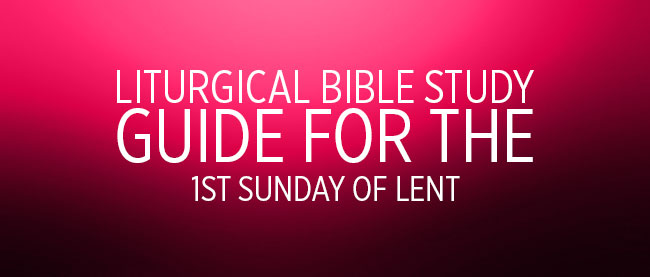1st Reading – Genesis 2:7-9, 3:1-7
The Book of Genesis (Greek for “origin”) records the creation of the world and our first parents, and the origin of sin; the history of mankind from the time of Noah; the Flood; the tower of Babel; the confusion of languages, and the division of the human race. The author then turns to the descendants of Shem, the eldest (firstborn) son of Noah, and deals with the greatest of these descendants, Abraham, the father of the chosen people. Then follows the history of Abraham’s son Isaac, of Esau’s forfeiture of his birthright blessing, and the succession of Jacob. Jacob’s fortunes are next related in detail. Lastly, the personal history of Joseph is told, and the migration of his father Jacob (Israel) and his brethren into the land of Egypt.
For almost 3,300 years the authorship of Genesis (along with the other four books that make up the Pentateuch) was attributed to Moses by both Jewish and Christian tradition. Although significant questions about his authorship were raised at points along the way, it was not until the 18th century that the question was seriously broached. Today it is commonplace that he did not write these books (at least not every part of them), but who the other authors might have been is unknown. At the time of Jesus, it was accepted that Moses was the author.
The primeval history, from which our reading for today comes, marks a significant beginning in that it underscores Israel’s own understanding of itself against the background of world history. In our reading today, the essential goodness of creation stands in stark contrast to human disobedience.
2nd Reading – Romans 5:12-19
Written by Paul from Corinth around the year 58, this is the most morally instructive of all his letters and also the most doctrinally profound. It is also very beautifully written, from a stylistic point of view. It contains a summary (naturally, an incomplete one) of Christian teaching, starting with the Old Covenant and an outline of God’s plans for man’s salvation after the fall of our first parents.
The letter is explicitly addressed to the Christians at Rome, whom Paul plans to visit on his way to Spain (a trip he never completed as once he got to Rome, he never left). He writes to preach the Gospel of God, for that is the mission to which God has called him; in particular he writes to the Christians at Rome “whose faith is proclaimed in all the world”; most of whom are Gentile converts. They are being told by Jews resident in Rome that salvation comes through the Law of Moses; whereas they had been taught that it was based on faith in Jesus the Christ, and that it was not necessary to keep the Mosaic Law. Paul feels that they need a more theological induction into that Christian teaching which they have already accepted and this is what he now gives them, at the same time announcing his forthcoming visit.
In our reading today, Saint Paul explains how the new Christian life brings about freedom from sin and death. Paul does this by comparing Adam, the first parent, with Christ, the head of the new humanity (the new Adam). He reflects on the sin of Adam (our 1st reading) in the light of the redemptive mystery of Christ. Sin, as addressed here by Saint Paul, refers to the dreadful power which has gripped humanity and is even now in revolt against the Creator and engaged in the exaltation of its own desires and interests.
Gospel – Matthew 4:1-11
After his baptism and before the start of his public ministry, Jesus was tempted by Satan in the desert. Today we hear of this temptation. Obedience to the Father is a characteristic of true sonship. The individual temptations related here are not as bizarre as they appear at first glance, they are all based on temptations to which the Israelites had succumbed during their forty years in the desert. In each case, Jesus goes to the section of Deuteronomy where Moses recounts these temptations and the correct response.


